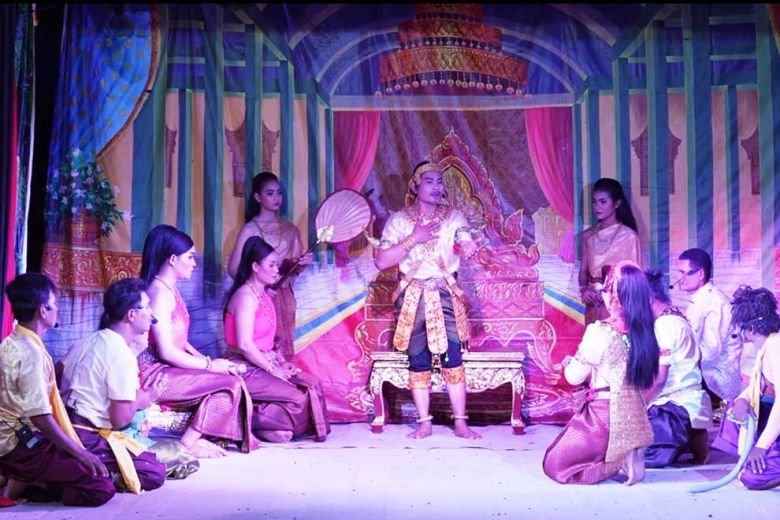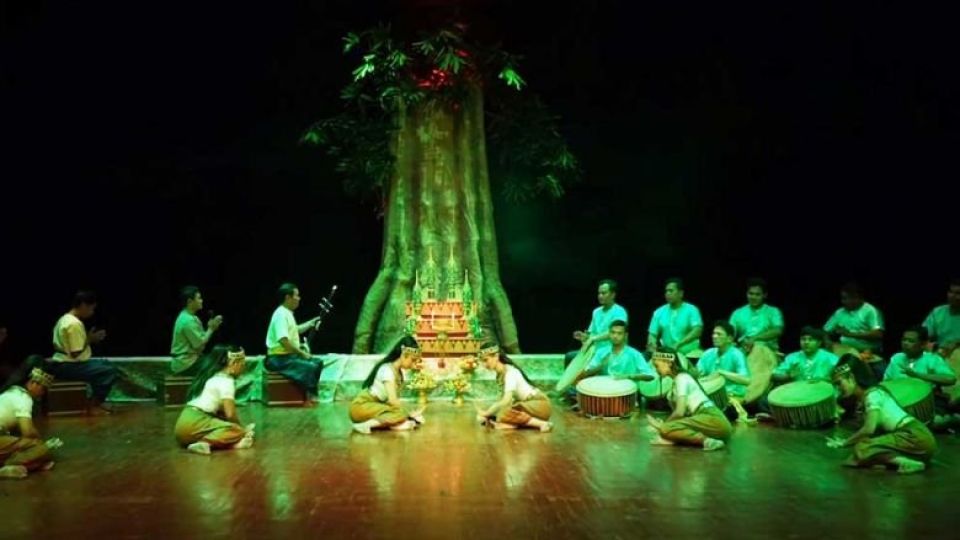August 8, 2023
PHNOM PENH – From an early age, Krouch Samban dedicated his free time to studying, practicing, and performing yike alongside his father and other troupe members.
In 2012 at the age of 15, he began showcasing his remarkable abilities in the traditional Khmer theatre form.
As troupe members aged and young performer became a Buddhist monk, the yike troupe of Nipech commune disbanded, leaving only a treasure trove of memories.
Venerable Samban breathed new life into the theatre, founding the Traditional Yike Group of Kampong Svay district – or Yike Wat Khtom – to honour the legacy of his father and grandfather, both noted yike performers.
In early 2020, Yike Wat Khtom emerged, thanks to the participation of elderly yike veterans of Nipech commune, Kampong Svay district, in Kampong Thom province.
“The idea struck me as I observed the declining presence of yike theatre in our community. As a devoted practitioner, I felt compelled to rebuild this cherished art form,” Samban explained.
Today, the troupe consists of 27 dedicated members, most of whom are over 50 years of age. Samban says he faces significant challenges as the younger generation show little interest in this cherished traditional Khmer art.
“Yike theatre holds the essence of our identity and history, and it saddens me to think that it might fade away with time if we don’t take action now,” he said.
“We must ignite the spark of appreciation in the hearts of the young, so they embrace and carry forward our treasured traditions for generations to come,” he added.
Preul Mom, who has over 15 years’ experience leading yike theatre troupes, said it was fortunate that during a new pagoda inauguration ceremony, the chief monk, Samban, encouraged former performers to reunite and perform for the occasion.
“Elderly people in the village started practicing and performed during the ceremony. Samban wanted to re-establish the yike troupe,” Mom told The Post.
Numerous children were eager to learn the art form, but regrettably, their enthusiasm gradually waned.
Traditional art forms like yike lack successors, making it crucial to preserve and revitalise these valuable cultural traditions, according to Mom.
Siyonn Sophearith, director general of the Directorate General of Techniques for Cultural Affairs at the Ministry of Culture and Fine Arts, acknowledged that classical art forms, including yike theatre, are facing a decline not only in Cambodia but also globally, including Europe.
The rise of technology has replaced many live performances, although Sophearith noted that yike theatre still finds support among local audiences.
“Prosperity increases the value of art; it depends on the promotion of value and spreading the word. Protecting our intangible heritage is not for the ministry to decide, but the community,” he told The Post.
“It depends on the villagers, and if they do not want to, what can we do? It is the soul that people in the community continue to inherit from generation to generation,” he added.
The yike troupe also faced setbacks during the Covid-19 outbreak, when gatherings and performances were restricted.
Sophearith and the culture ministry extended their assistance to the theatre group.
“We help them as best we could, as part of our own efforts to make them aware of the value of what they are doing,” he said.
“By offering financial support, we hope to help them awaken to their full potential,” he added.

Krong Sopheamit’s yike troupe perform in 2022, during Khmer New Year celebrations. PHOTO SUPPLIED
Despite facing the uphill battle of preserving yike’s rich heritage, Samban remains optimistic. He has started recruiting members from other regions, particularly those skilled in music and orchestras.
“By seeking out and supporting artistic talents from various villages, I hope to preserve and revitalise the yike art form, ensuring its legacy continues to thrive,” he explained.
The yike troupe enjoys a surge in invitations to perform during the dry season. From the Kathin festival in October to November, the troupe gains increasing popularity, attracting requests to perform at festivals such as Bun Phum and others.
The performances centre on Khmer literature and traditional storytelling, but creating new stories poses challenges due to a lack of co-writing and rehearsal opportunities.
To ensure accessibility for various pagodas, the troupe charges reasonable prices for its performances, making it comparable to the bassac theatre.
Despite their dedication to preserving traditional Khmer art, the cast members, who are mostly over 50 years old, do not receive substantial remuneration.
Samban said they perform out of their passion for promoting this cultural heritage and as a personal form of entertainment while contributing to the cultivation of new artistic talent.
“There are many pagodas that want our yike troupe to perform, but sometimes the schedules overlap, and we cannot accept all the invitations,” he explained.
“Our members are paid from $10 to $15 per show, depending on whether the show is performed close to our homes or not,” he added.
With the assistance of the culture ministry, Sophearith says the troupe is able to generate an income which benefits the development off their local community.
During this year’s dry season, Yike Wat Khtom performed numerous times, with each performance earning them $700, according to Sophearith.
“This ancestral heritage can help sustain classical theatre, as the prime minister suggested. Now, the troupe is doing well,” he said.
Samban urged people to support all forms of traditional Khmer arts by attending performances and sharing them on social media to raise awareness.
“I encourage all artists and art enthusiasts to engage with yike theatre and promote it on social media, so that Cambodian children and the world can learn about it,” he said.
He warned that as time passes, only a few dedicated artists remain, and if they are not supported, both the essence of the performances and the traditional songs might be lost to future generations.


